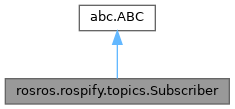Loading...
Searching...
No Matches
rosros.rospify.topics.Subscriber Class Reference
Stand-in for `rospy.Subscriber`, wrapping the creation of ROS2 subscription. More...
Inheritance diagram for rosros.rospify.topics.Subscriber:

Public Member Functions | |
| __new__ (cls, name, data_class, callback=None, callback_args=None, queue_size=None, buff_size=None, tcp_nodelay=None) | |
| Returns rclpy.subscription.Subscription instance, supporting `AnyMsg`. | |
| __subclasshook__ (cls, C) | |
| Returns true if C is a ROS2 subscription class, else `NotImplemented`. | |
Detailed Description
Stand-in for `rospy.Subscriber`, wrapping the creation of ROS2 subscription.
Member Function Documentation
◆ __new__()
| rosros.rospify.topics.Subscriber.__new__ | ( | cls, | |
| name, | |||
| data_class, | |||
callback = None, |
|||
callback_args = None, |
|||
queue_size = None, |
|||
buff_size = None, |
|||
tcp_nodelay = None |
|||
| ) |
Returns rclpy.subscription.Subscription instance, supporting `AnyMsg`.
- Parameters
-
name graph resource name of topic, e.g. 'laser' data_class data type class to use for messages, e.g. std_msgs.msg.String callback function to call ( fn(data)) when data is received. If callback_args is set, the function must accept the callback_args as a second argument, i.e. fn(data, callback_args).
- Note
- Additional callbacks can be added using add_callback().
- Parameters
-
callback_args additional arguments to pass to the callback. This is useful when you wish to reuse the same callback for multiple subscriptions. queue_size maximum number of messages to receive at a time. This will generally be 1 or None (infinite, default). buff_size ignored (ROS1 compatibility stand-in) tcp_nodelay ignored (ROS1 compatibility stand-in)
◆ __subclasshook__()
| rosros.rospify.topics.Subscriber.__subclasshook__ | ( | cls, | |
| C | |||
| ) |
The documentation for this class was generated from the following file:
- rosros/rospify/topics.py